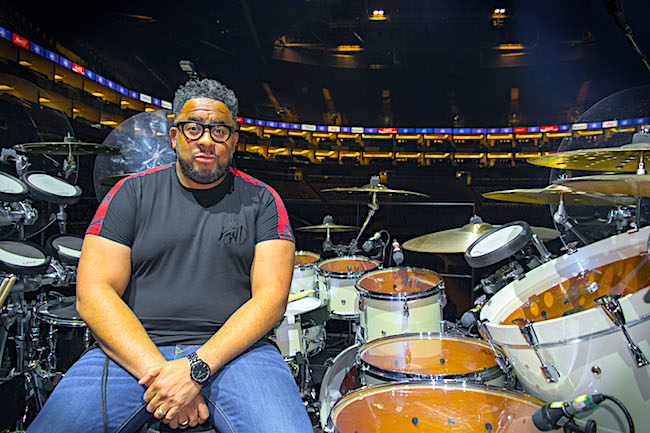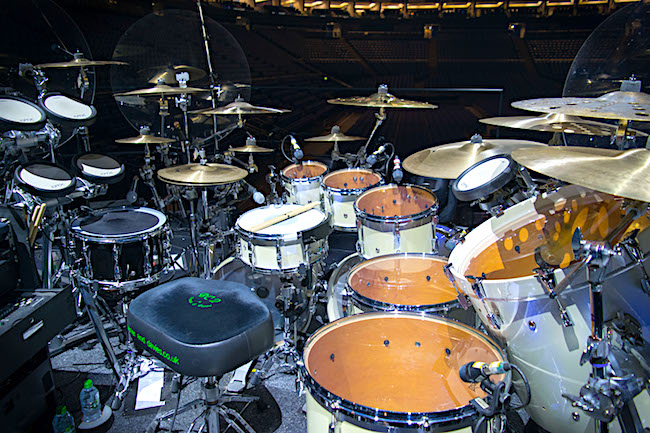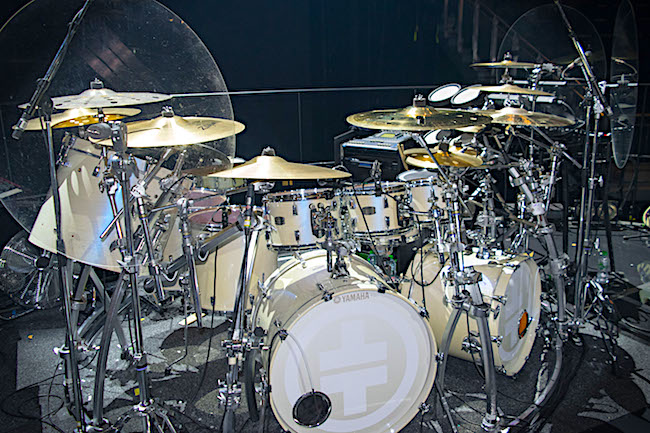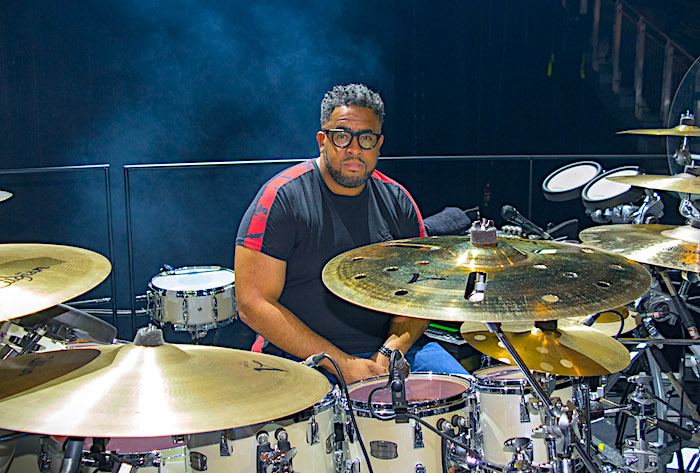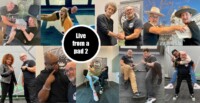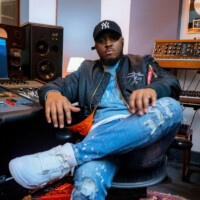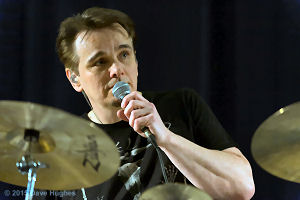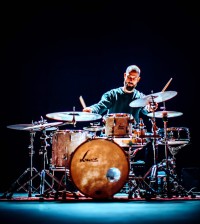In a competitive industry full of top players, a drummer who gets to keep a gig for over 13 years must be special.
Introducing Donavan Hepburn…
From his early beginnings playing in church in his home town of Birmingham, Hepburn soon found himself drawn towards London where professional gigs awaited.
Over the next few years he made a name as one of the most versatile and solid drummers in the UK and accumulated names like Mis-teeq, Ms Dynamite, Lemar, and Adele on his CV.
Today, Donavan is a sought after drummer far beyond Britain’s borders and spends most of his year touring the world with two very different acts, demonstrating his relevance across all genres: tight grooves and electronics with English pop icons Take That; and tasty, all-acoustic drumming with an old school twist as part of songwriting legend Jeff Lynne’s ELO.
I met up with Donavan at the O2, ahead of a Take That show, to chat about his upbringing, his way into the session scene and his work as a fixer and MD with his own company TWENTY DB.
Your initial contact with drums was due to your brother.
Yes. I’d have to go back to about 1983, I was 4 years old. I remember the day coming down the stairs in my family home and going into the front room to the absolutely astonishing sight of my older brother Martin having bought this white Pearl Export drum kit. It seemed like the kit just filled the whole room. I remember the hi hats coming up over my head. That gives you an idea of the size I was at the time. I was absolutely amazed by it and I think that’s when the initial seed was sown.
That turned into me playing pots and pans all around the house and that was just in me for all of my early years. I didn’t even take any drum lessons at school, it was just something did it. My brother was the resident church drummer so I would sit there watching him every Sunday.
When I was about 11 or 12 my brother and his wife were expecting their first child so towards the due date he stayed at home. My friend at the time convinced me to get up and have a play at church which I did, but was soon told to come off. I remember practising hard all week and came back the next Sunday and that was it, I was in. I transformed into the resident drummer and the rest is history.
It all really comes down to being mesmerised by that first drum kit and over the years, whatever drum company I used, I always made sure I had a white kit. It’s an absolute tribute to my brother.
My whole family have always been mega supportive about what I do and nothing pleases me more than having them at a show where they can see me. I’ve been very fortunate.
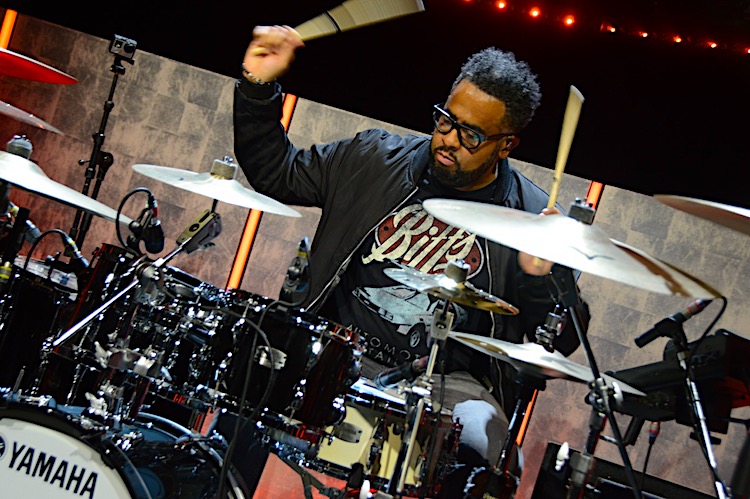 So did the church upbringing play a big role in your musical upbringing too?
So did the church upbringing play a big role in your musical upbringing too?
Definitely. Church is where my whole musical journey started. I was brought up in a Christian home and church was, and still is, a key part of my life. It’s the sort of place where at any given point somebody would just start singing and you’ve got until the second time they come around to be playing. Unbeknown to me that was training my ear from my early teens to my 20s. You’re searching for beats and timing and you’re almost subconsciously training your ear. Coming up with a part and being creative with a beat it part of that process. I feel quite privileged to have that background and it’s without a doubt the foundation of what I do now.
You grew up in Birmingham. How did getting in the industry from there compare to being in London?
I turned professional in ’99. At the time I played with local bands, choirs and various groups around the West Midlands and my venture to London was really a result of the Spice Girls phenomenon. Their record label signed 10 brand new acts and it so turned out that a very close friend of mine was playing with one band in London and did some recording with another.
One thing led to another and this other band needed a live band. It clashed with his schedule so he asked me to do it. That was my way in. It was really odd actually because my background is Gospel, Hip Hop, Soul and R’n’B but my first professional gig was Indie, which absolutely threw me out of the water. I remember thinking at the time that there is obviously something there that I have to learn so I just applied myself. Instead of starting the kit with 8” and 10” toms I went for 12”, 13” and 16”. I just tried to learn that new genre.
It was a really great learning curve and it reminded me in many ways of my journey through playing at church. It was just another new set of rules that I had to learn very quickly. That was really good for me. Even now being the resident drummer for Jeff Lynne’s ELO throws me back to those early days. Supposed I wouldn’t have been up for learning different styles, all of this would have never happened. Now I’m in the very fortunate position where I can work with a band like Take That and also be relevant to a band like ELO, play their music on a different set of drums with a different sound, and still be able to bring my personality to both things. I think that’s an important tool to have for players.
What those experiences showed me was that as a session musician it’s incredibly important to just have a knowledge of music as a whole. That’s what I did and still do. I’m still excited about discovering new music
So that Indie band was your first pro gig?
Yes. It was a band called ‘Day One’ from Bristol. They were signed to Massive Attack’s label so it was kind of Indie meets Trip Hop. I had to trigger loops with the left hand and play the beats at the same time. It was completely new to me but I just embraced it.
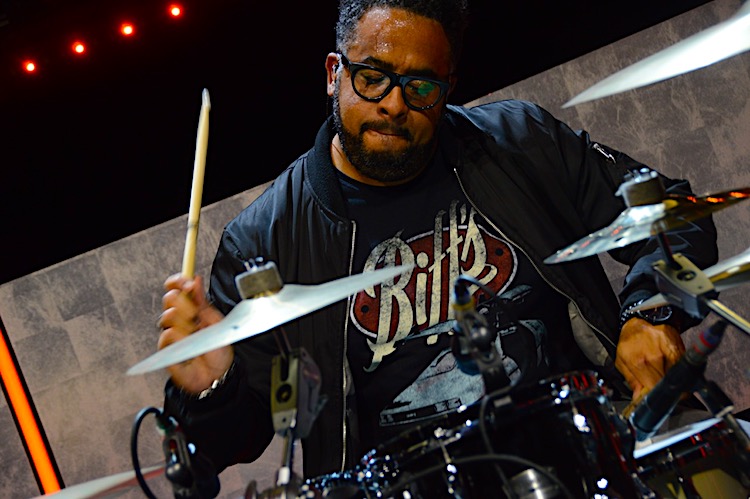 From there it really just blew up…
From there it really just blew up…
Yeah it sort of did because you come to London and meet new people. That all happened early 2000 and then in 2002/2003 I was approached for the Mis-Teeq gig via an agent I had at the time. That was a great and just felt like a real poignant time in my career. I met the girls, they were absolutely great. I’m still very good friends with Alesha Dixon now and have worked with her as a solo artist as well. That was a great time.
That led me onto bits with Lemar and around 2005 to Ms Dynamite. That was actually quite a key moment for me because unbeknown to me when I was doing the Ms Dynamite stuff, the current musical director for Take That was watching me the whole time. He was the MD for Sugarbabes at the time and we did a lot of the same festivals and TV shows and he was sort of checking me out. Then in 2006 he approached me for Take That. That was a big deal. It was at a point were I got engaged and it just felt like the stars aligned. “Honey, it’s gonna be ok, I got a big gig. We can get married and have kids”.
So yeah, as I mentioned I had some poignant moments in my career: ’99 being the very beginning, 2003 landed Mis-Teeq, 2006 Take That and 2013 ELO. Also being the resident drummer for the Diamond Jubilee in 2012. I’m a crazy football fan and that’s like the England call up when you play for your country. That was a proud moment for me.
You also worked with Adele.
Yes, I was her drummer on the first campaign “19”. I remember doing that gig thinking this feels like it’s just gonna blow up. Obviously I went back to Take That and she just took off.
We’re backstage here at the O2 before your show with Take That tonight. It’s your 13th year with the band?
Yeah. It’s been a brilliant journey and I can still remember getting the call on January 1st 2006. First day of the year and Mike Steven calls. He goes: “Don, there are 9 little shows and we’ll see where it goes”. 9 turned into 11, that turned into 23, that turned into 29 including stadiums and there it was. Now we’re sitting here 13 years later. It’s been absolutely brilliant. On a personal note I can attribute different tours to different phases of my life.
The very first tour, 2006, finished a few days before my wedding. When I came back from my honeymoon I flew straight to Manchester for the production rehearsals for the stadium leg of that tour. Being involved in the ‘Beautiful World’ tour was basically their rebirth as a man band. In 2009 we did the ‘Circus’ tour playing massive stadiums and during that my first daughter was born. I was playing Wembley stadium and my wife and the new born baby were waiting in the hotel down the road. That was crazy.
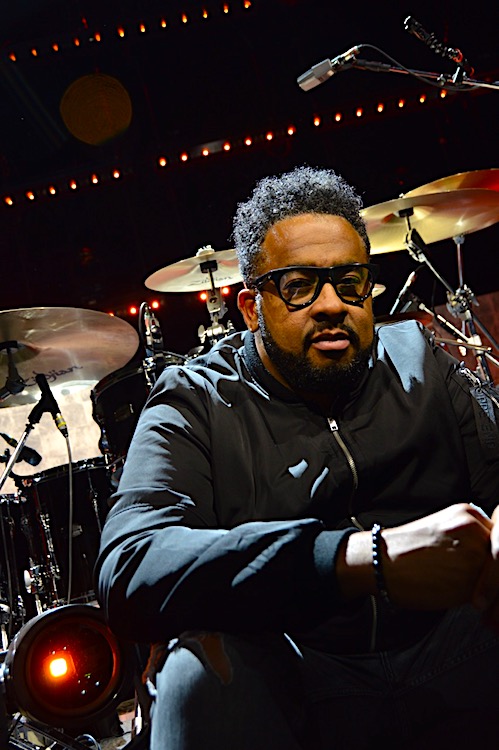 After ‘Circus’ we did ‘Progress’ in 2011 for which Robbie Williams came back so it was the whole original band together and we played some of Robbie’s songs too. When they split up and we did the tour with only three of them my second daughter was born.
After ‘Circus’ we did ‘Progress’ in 2011 for which Robbie Williams came back so it was the whole original band together and we played some of Robbie’s songs too. When they split up and we did the tour with only three of them my second daughter was born.
‘Wonderland’ a few years later was my first tour in the round which was a weird experience because you have people behind you.
That brings us to now where they’re celebrating their 30th year of being Take That and I’ve been around for nearly half of that. It’s amazing. I can’t reiterate how grateful and privileged I feel; and how much I don’t take it for granted.
They’re a really nice bunch of people and I would consider them real friends. Our wives know each other, our kids play together… it’s like being in school. We are genuinely having fun the whole time and it comes across. It’s definitely not just another day at the office.
As your part of the Take That tour is coming to a close soon you’re heading back out on the road with Jeff Lynne’s ELO.
Yes, we’re touring North America. It’s essentially the other half of the tour we did last year. It’s about 25 or 30 cities we haven’t done yet. That gig speaks for itself. It’s arguably one of the best things I’ve been involved in – simply because he’s a living legend. You talk about Jeff Lynne in the same breath as The Beatles, Tom Petty and Bob Dylan. I don’t just say that – we play gigs and these guys are there. I met Tom Petty, Ringo Starr… they are fans and friends of him. I had this moment last year when we played The Forum, in Inglewood, California. For me as a drummer this was huge already but Stewart Copeland was there, Steve Ferrone was there and Jim Keltner was there. All on the same night!
I got to meet Jim backstage and it was absolutely amazing. I remember him shaking my hand and I was holding his hand really gently just staring at it thinking “those are the hands that did all of this stuff”. Oh my god. That was the guy who played drums on the Travelling Wilburys, now I have to go out there and play those tunes in front of him.
I know that tune, I’ve have played it for years, but I had never played ‘Handle With Care’ with so much thought like when knowing the guy who played it originally was in the venue. After the show Stewart Copeland came to see me, hugged me, lifted me up and said the nicest words about my playing.
I was so star-struck. Those were the guys I would have poster of as a kid. It made me feel very reflective of being a kid who has a dream and aspirations. Don’t let anybody fool you and tell you you’re in dreamland. When I got back to my hotel room, I just sat on my bed and called my wife telling her about my bizarre night.
That gig has definitely put me on a world map. It’s really cool and I do genuinely enjoy it. I’m a fan of the music, a new fan, but discovering it from a compositional standpoint was great. ELO had a sound and I was straight on the phone to my companies. Yamaha sorted me out with a mid 90s 9000 drum kit, I took the bottom heads off and put some clear Remo CS batters with the black dots on to get that real old school sound.
We went on to play Wembley Stadium, the Hollywood Bowl, Madison Square Garden… it’s the stuff of dreams. Now later on in my life I’ve learned to take time to appreciate that. I have that thing that at some point in the show I just take a look and really snapshot it in my mind to appreciate the moment. That’s definitely been a thing since the last 5 years. As a kid you’re sort of all over the place but the older you get, the more it sinks in.
I feel very privileged to have two very different iconic gigs that I’m a part of. And it just all boils down to that initial approach of having the application for different styles. It’s been awesome man. I’m sitting here in my 20th year as a professional drummer and I have a lot to be thankful for.
You’re using quite a bit of electronics on this gig. Is it the same with ELO? The two gigs are very different from each other it seems.
Yes, there a lots of electronics on the Take That shows. This is essentially their greatest hits tour so they went back to the original multitracks to get samples. On ‘It Only Takes A Minute’ for example I’ve got a big sub/dance kick drum sample that I’m triggering under my live kick. There are also a lot of 808 snares and clap sounds triggered. It’s quite involved electronically just to give it that authenticity but with the foundation of a live acoustic kit.
But then on ELO it’s all strictly acoustic. There are no electronics on it.
Let’s chat about your company ’TWENTY DB’.
TWENTY DB was set up in 2011 and is the companyfor everything outside of ‘Donavan the drummer’. It’s a music staffing company so we provide musicians, singers and crew. It’s growing and growing and we have a good client roster of artists we have provided services for. It really feels like the next phase of my career and it’s great because it’s a different responsibility – one that I really enjoy and am passionate about. It’s hard work but I have a great team around me that takes care of the day-to-day running of it. When I’m on tour I have groups of different musicians working on other projects. It’s quite a busy time for us at the moment.
I work on it a lot between tours but even now when I finish my gig here I’m straight back to my hotel room where I have my studio set up and program for new artists. There is just always something to do and changes to be made. I’m really proud of it but yeah, I’m just trying to stay busy and under the radar.
As a band fixer and MD, what boxes does a professional session drummer have to tick nowadays?
I think it’s about attitude. That plays a massive part – and certainly as a band fixer that’s one of my key things I take pride in. Going for lunch and seeing what these people are like, going to check them out on their gigs and just having a look if they’re cool and I can work with them.
Application is the second thing. When I did a few auditions (I remember one in particular) where I got there and there was a ton of other drummers there. It just felt weird. I decided that if I’m ever in charge of doing this sort of thing, I’m going to do it in a much better way. So I make sure that no two people are there at the same time and I almost treat it as if they’d already got the gig.
I do a little minute and a half edit of a tune so we get the highlights and send that out saying this is what I want them to prepare.
The reasoning behind that is that one: I send the song out to see how they apply themselves and if they pay attention to it because that gives me an insight into how you would be in a work environment if you were successful and get the gig. I do that purposely to see if they’re already thinking along those lines.
So attitude application is key for me really.
And just having an open mind in terms of varied styles. I’m not in any way a virtuoso on any particular style but I think one of my major strengths is that I have a real great appreciation for all types of music. I really do. I don’t just sit there and go “Oh God it’s not. R’n’B so I’m not into it”; I try to find something in it. That’s why I enjoy the fixing side of things as well because it’s so varied. I went to a concert that a friend recommended recently and although it wasn’t really ‘my thing’ I sat there and just thought: this is great. I really appreciated it as a punter and just had a really nice night I think sometimes as musicians we can be a bit too opinionated. Of course opinions are fine but certainly as a session player it’s important to have an appreciation. And if you’re not keen on a particular genre, don’t entertain it because you’re being paid to.
I had guys in the past that said: “I appreciate the call but this is not really my thing”, and I respect that. That’s much better than taking the gig and being burdened with it.
One of my biggest turnoffs is to be in a band or working with musicians who you are not enthused about it. So you’re just here to earn the money? Luckily it’s very rare that I’m in those scenarios anymore. Obviously sometimes there are things going on and there might be other contributing factors but for the most part there is no excuse.
I feel extremely blessed that I’m able to earn a living from the gift that I was given. I’m able to earn a living from it, have fun, travel and provide for my family. I’m very grateful every day for what I have, I really am. I’m not saying that I’m on cloud nine all the time because there are times where I’m tired and exhausted, but for the most part I’m like: it’s not bad this.
Is all your work on TWENTY DB maybe a little in preparation for stepping back from touring so much in the future?
Without a shadow of a doubt, yes. I love being behind the kit but as we know in the world of sessions the work isn’t always there and I never wanted to be the guy who is waiting for the phone to ring. I’ve always been pro-active.
I also wouldn’t want to be the 40 year old guy playing with the new 19 year old artists, but I know that my experiences in front of the kit putting it all together is invaluable to that person.
I’ve had the great privilege of working under one of arguably the countries greatest musical directors in Mike Stevens. That has definitely mentored me. He offered me advice and I’m always on the phone to him talking about ideas for projects. It’s great to have him there at the drop of a hat to offer advice. He’s even passed on work to me that he couldn’t do.
I did an MD job for Sam Smith. They had a band already but I was brought in to work on the show. The whole band are outstanding players but I brought backing vocalist section and a string quartet in. My proudest moment with Sam was putting a show together for Madison Square Garden. That was a big deal for me, you know. I played that venue as an M.D. before I played as a drummer. It was a really special moment.
So yes, it definitely feels a transition and it’s exciting.
On the note of planning on maybe stepping back from touring a little: you are married and have two little daughters. It must be hard being away that much.
Yes. This is what I do for a living, it’s my job, and they are very supportive and come along all the time. Yes there have been a lot things I’ve missed, a lot of ‘firsts’ I’ve missed but I make sure that the pluses outweigh the minuses. We get to do some amazing things at the drop of a hat but it’s still coupled with certain disappointments like my absence.
Technology has absolutely changed the game though. Every morning I have my time with the kids via Facetime chatting about stuff. I’m there while they’re having breakfast or they take me on their walk all the way to school.
It’s tough but in my time quality outweighs quantity. We have great family holidays and me and my wife go away for a few days from time to time too.
Thanks a lot for your time Don!
Interview by Tobias Miorin
June 2019

